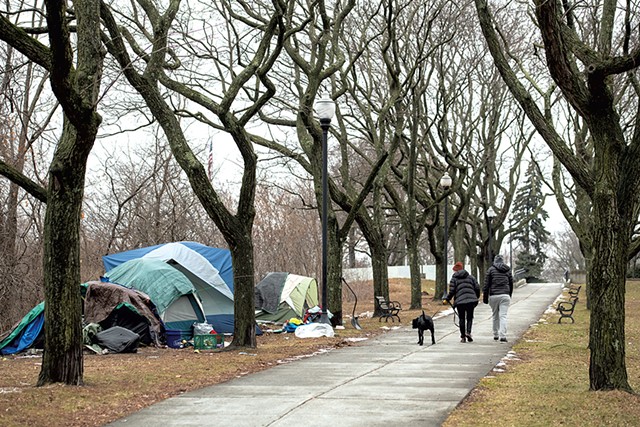
- Daria Bishop
- An encampment on Battery Street in Burlington before it was cleared out
Burlington's homeless shelters have nowhere near enough capacity to put up all the people seeking a bed. So last Thursday afternoon, as they have each day this winter, people began queuing up behind the repurposed Veterans of Foreign Wars building to compete for a place to sleep.
Aunnah Guzman, 29, was first in line. She had arrived at noon, five hours before the temporary shelter was to open, to make sure she'd land a spot. The city-run facility has about 30 beds, but only a third are available to walk-ins each night — first come, first served.
"I have a sense of security — some sense of security — as long as I show up," she said, huddled in a heavy coat for warmth on a wet curb. "So, I show up."
Eight more people were in line by 1 p.m. They smoked cigarettes and ate homemade burritos dropped off by two men in a van. One woman paced the parking lot, talking to herself. Another laid out blankets.
"I'm taking a nap," she announced. "No one take my spot!"
The number of people without shelter in Burlington has jumped to levels that, for the first time in memory, eclipse the city's ability to provide emergency quarters for everyone.
The city estimates that somewhere between 200 and 300 people are unsheltered in the Burlington area, up from fewer than 50 a year ago. The sharp increase has led to fierce competition for limited beds and has forced shelters to turn people away each night.
They've wound up pitching tents in city parks, squatting in abandoned buildings and spending nights in parking garages. Neither the city nor advocates for the homeless have come up with an immediate remedy, leaving few options for those without shelter.
Alcohol dulls the piercing cold for Zane Davison, 29, who has slept outside this winter when he couldn't get to the shelter in time. "At least then I can train my nerves to think that I'm not cold," he said. (Alcohol, however, actually increases the risk of potentially life-threatening hypothermia, according to research.)
During cold snaps in previous years, service providers could reliably connect someone with a bed at a local shelter or a room in the state's long-running motel program. But several factors have made it much more difficult to find beds.
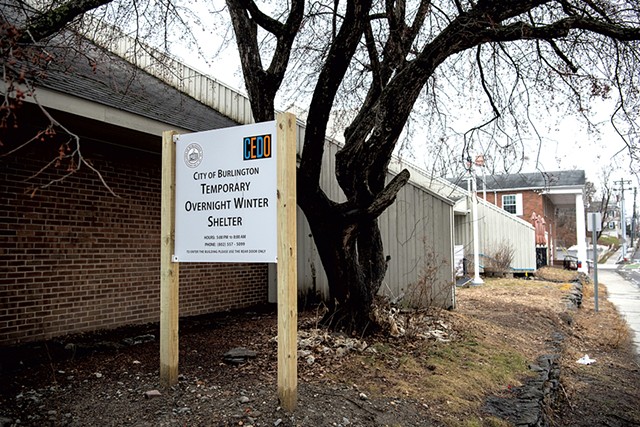
- Rachel Hellman
- The shelter at the former Veterans of Foreign Wars building
Last January, Chittenden County had an estimated 45 unsheltered residents, according to Vermont's federally mandated tally of people living outside, known as the Point-in-Time count. This year's tally, conducted last week, won't be finalized until later this year, but data from other sources have the city expecting a much higher count.
In the weeks after the state evicted some 800 people from a pandemic-era motel program last June, Chittenden County service agencies reported engaging with more than 200 people thought to be living outside. The population has held steady ever since.
"We've never seen numbers that high," said Sarah Russell, the city's homelessness liaison.
Other factors are at play, too. Low-income households have been battered by steep rent hikes and persistent inflation, leaving many unable to afford basic living expenses. A worsening drug problem has also made it harder for some people to keep affordable apartments once they receive them. Landlords filed a record number of evictions last year.
The increase in unsheltered people is all the more shocking, Russell said, considering how many more beds exist today compared to just several years ago. Since 2019, shelter capacity in the Burlington area has grown from 149 to 349, with 90 percent of the beds located in the Queen City. Every shelter now has a wait list; more than 115 people are vying for a spot at the Elmwood Avenue pods.
"That's why I'm here," said Betsy Call-Trottier, 40, who showed up four hours early at the VFW last Thursday. "There's nowhere else to go."
The state's cold-weather motel program typically offers a backstop for those turned away from homeless shelters. That program, established long before the pandemic, eases its eligibility requirements during the winter months.
The program had enough rooms for about 1,800 households last year. But some motel owners chose to stop participating, and there are now 200 fewer rooms to go around. On Monday, the Department for Children and Families, which runs the motel program, reported that there were almost no available beds anywhere in the state. The department says it's turning away 60 callers each day.
Last February, when temperatures dipped into the negative teens, Burlington opened an emergency shelter at the Robert Miller Community and Recreation Center, providing cots to about 100 people over a three-day period. The city is prepared to do that again should it be necessary, Russell said, but there's only enough room for about 130 people. That would still leave an estimated 100 people outside, with no place to go.
"That's unacceptable," Russell said.
With limited options, some people have resorted to living in tents. The city says it's aware of roughly half a dozen active encampments. Most are hidden from public view, but one, located along the sidewalk on Battery Street, drew a lot of attention this winter as tents came to line the lakefront promenade.

- Daria Bishop
- City workers cleaning up the Battery Street encampment
City ordinances ban camping in public parks, but officials said they waited to clear out the encampment until the overnight shelter at the VFW opened in mid-December. Two weeks ago, the city finally moved to clear out most of the tents, saying at the time that it was working to find housing for the few people left behind. On Monday, city workers brought several vehicles to clear out the rest.
One man guarded his friend's belongings, which had been stuffed into plastic storage bins provided by the city. He said he wasn't sure where his friend would sleep on Monday night.
"I can't believe they're doing this," said Rainbow Cornelia as she stopped to watch the scene while walking her dog. Cornelia lives in a subsidized apartment near Battery Street and said she complained to the city after the encampment was cleared the first time.
"I wasn't very polite," she admitted. Seeing city workers there a second time renewed her anger. "Who are they hurting? What is the problem?"
City officials have expressed their own frustrations over the state's response to the crisis. Earlier this month, Mayor Miro Weinberger, who has hinted at his own gubernatorial aspirations, wrote a memo to Gov. Phil Scott's administration pleading for another extension to the motel program, which is set to expire in April.
The city, with assistance from the Chittenden County Homeless Alliance, has already helped more than 150 households transition from the motels into permanent housing through the county's "coordinated entry" system. With just two more months, the mayor asserted, the city would be able to find permanent housing for the 115 or so households still living in Chittenden County motels.
Last week, the Vermont House voted to extend the program through June, which would give lawmakers more time to come up with a long-term solution. In search of a more immediate remedy, the Scott administration has proposed opening five new shelters statewide by April 1. But few believe that target date is realistic. Even if it were, officials acknowledge that the 225 or so new beds wouldn't be enough to house everyone.
Back at the VFW last Thursday afternoon, Davison was third in line, which meant he was likely to get a spot as long as he stayed put. That was a relief for someone who had been sleeping in a terminal at the Burlington International Airport and, before that, in the hallways of apartment buildings.
Guzman, meanwhile, was holding out hope that she might eventually qualify for one of the shelter's permanent beds. She wasn't sure how long that might take or what she needed to do to make it happen. But she figured there was only one way to find out.
"Just keep showing up," she said.

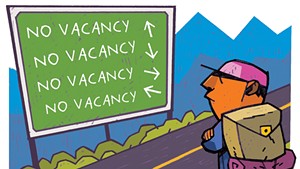
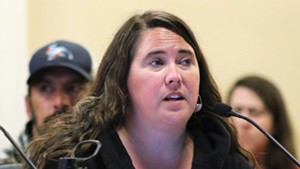
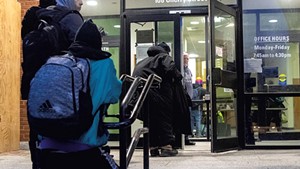










Comments
Comments are closed.
From 2014-2020, Seven Days allowed readers to comment on all stories posted on our website. While we've appreciated the suggestions and insights, right now Seven Days is prioritizing our core mission — producing high-quality, responsible local journalism — over moderating online debates between readers.
To criticize, correct or praise our reporting, please send us a letter to the editor or send us a tip. We’ll check it out and report the results.
Online comments may return when we have better tech tools for managing them. Thanks for reading.